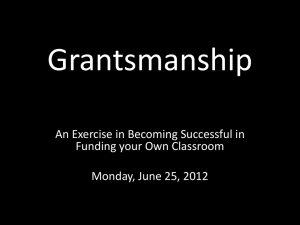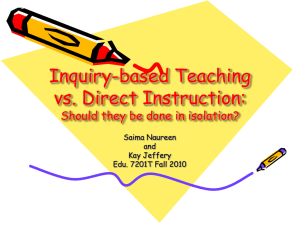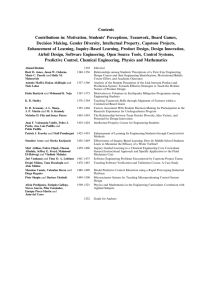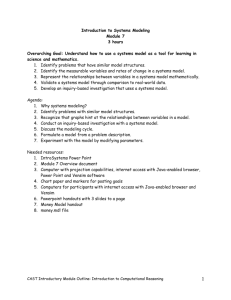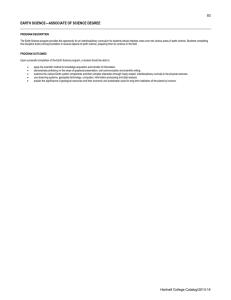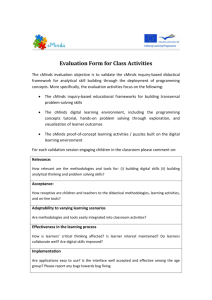College of Education and Behavioral Sciences (CEBS) Office of the Dean 54662
advertisement
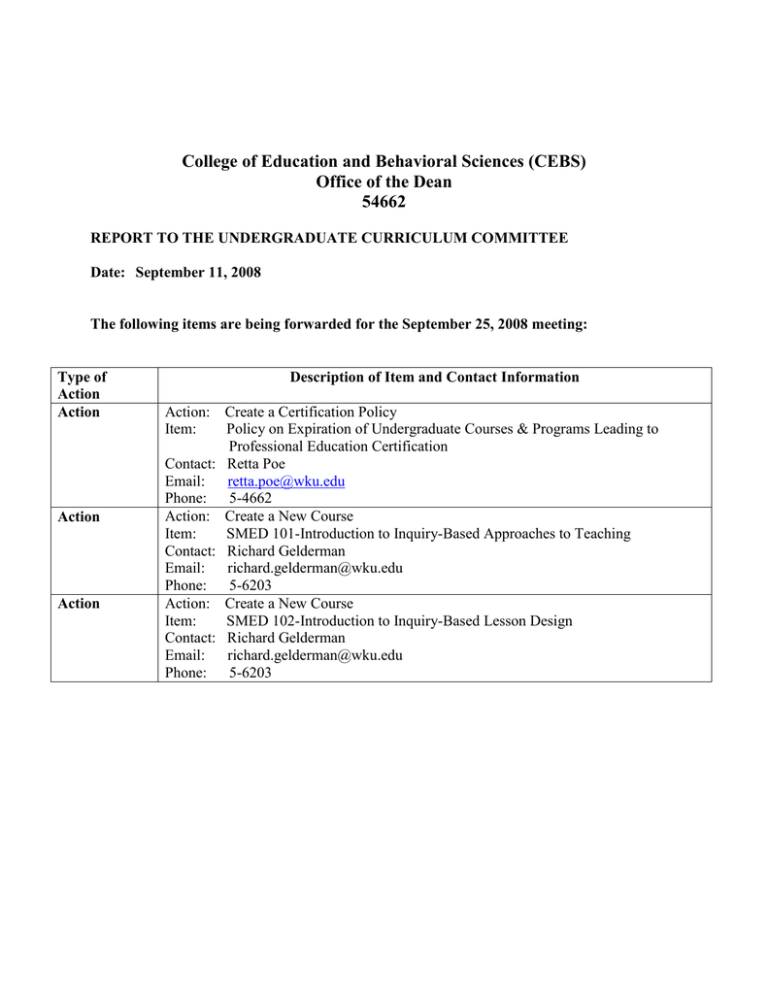
College of Education and Behavioral Sciences (CEBS) Office of the Dean 54662 REPORT TO THE UNDERGRADUATE CURRICULUM COMMITTEE Date: September 11, 2008 The following items are being forwarded for the September 25, 2008 meeting: Type of Action Action Action Action Description of Item and Contact Information Action: Item: Create a Certification Policy Policy on Expiration of Undergraduate Courses & Programs Leading to Professional Education Certification Contact: Retta Poe Email: retta.poe@wku.edu Phone: 5-4662 Action: Create a New Course Item: SMED 101-Introduction to Inquiry-Based Approaches to Teaching Contact: Richard Gelderman Email: richard.gelderman@wku.edu Phone: 5-6203 Action: Create a New Course Item: SMED 102-Introduction to Inquiry-Based Lesson Design Contact: Richard Gelderman Email: richard.gelderman@wku.edu Phone: 5-6203 Proposal Date: 07/18/08 College of Education and Behavioral Sciences Proposal to Create a Certification Policy (Action Item) Contact Person: Retta E. Poe, retta.poe@wku.edu, 745-4662 1. Identification of proposed policy: Policy on Expiration of Undergraduate Courses and Programs Leading to Professional Education Certification 2. Statement of proposed policy: For undergraduate certification-only programs: A student who entered WKU as a beginning freshman or transfer student Fall 2005 and thereafter (i.e., iCAP-eligible students) will be allowed seven consecutive years from the student’s catalog term (initial term of entry) to complete teacher certification requirements. The Dean of the College of Education and Behavioral Sciences may grant an extension to this deadline. For undergraduate courses used to satisfy requirements in programs leading to teacher certification: Approved courses for programs leading to teacher certification must be aligned with current standards. Some older courses are not aligned with current standards, and thus it may not be appropriate to count them in a student’s program. Generally speaking, professional education and “content” courses used to satisfy program requirements in programs leading to professional education certification should be no more than 10 years old. Decisions about whether older courses may be used will be made on a case-by-case basis by the department head of the student’s major. Students who wish to use courses taken more than 10 years ago to satisfy program requirements may be required to demonstrate proficiency related to current course content and learning outcomes. 3. Rationale for proposed policy: Although the undergraduate catalog includes policy statements regarding expiration dates for undergraduate degree programs, no formal policy exists regarding expiration of courses and (non-degree) programs leading to professional education certification. Such a policy is needed to provide guidance both to advisors and to students who wish to complete programs after a long interruption. The goal of the policy is to help assure that students recommended for certification in professional education have knowledge and skills that meet current standards. 4. Impact of proposed policy on existing academic or non-academic policies: The proposed policy is consistent with undergraduate policies regarding completion of degree programs. 5. Proposed date of implementation: The policy will be implemented immediately. Informally the policy has provided guidance for certification recommendations for at least the past 10 years; approval of the policy will assure more consistency in its application. 6. Dates of approval: CEBS Curriculum Committee 9/2/08 Professional Education Council 9/10/08 Undergraduate Curriculum Committee University Senate 9/25/08 __________________ Proposal Date: 3/12/2008 College of Education and Behavioral Sciences Department of Curriculum and Instruction Proposal to Create a New Course (Action Item) Contact Person: Richard Gelderman, richard.gelderman@wku.edu, (270) 745-6203 1. Identification of proposed course: 1.1 Course prefix and number: SMED 101 1.2 Course title: Step 1: Introduction to Inquiry-Based Approaches to Teaching 1.3 Abbreviated course title: Step 1: Inquiry-Based Teaching 1.4 Credit hours / contact hours: 1.0 / 1.5 1.5 Type of course: A (Applied Learning) 1.6 Prerequisites: none 1.7 Course catalog listing: Introduction to theory and practice necessary to design and deliver high quality inquirybased math and science instruction. Students explore and practice the guided inquiry process, create lesson plans and implement them during visits to elementary classrooms. Fieldwork required; students are responsible for arranging their own transportation to sites. 2. Rationale: 2.1 Reason for developing the proposed course: This course is part of SKyTeach, a National Math and Science Initiative (NMSI) funded program to replicate the University of Texas at Austin’s UTeach curriculum for preparation of math and science teachers. Adopting this sequence meets NMSI’s requirement for replication of UTeach at WKU. In this first course of the SKyTeach curriculum, students are invited to explore teaching as a career by teaching math/science lessons in elementary classrooms. The early field experience allows students to obtain direct experience with planning and implementing inquiry-based lessons, led by SKyTeach Master Teachers who are experienced middle or secondary teachers. The elementary classrooms will be selected both for diversity of the student body and for quality of the classroom teacher, providing the best and most supportive environment for this first taste of teaching. 2.2 Projected enrollment in the proposed course: Based on enrollments in current math and science teacher education sequences and the successful recruitment of math/science majors for the one-time-only fall 2008 sections of this course, we expect 80 students per year. When the SKyTeach program is approved, it will become the sole path to math/science teacher certification for middle or high school. 2.3 Relationship of the proposed course to courses now offered by the department: The combination of this course and SMED 102 most closely resembles EDU 250 and MGE 275; however SMED 101 goes beyond classroom observations to include planning and teaching math and science lessons in classrooms supervised by experienced elementary teachers. 2.4 Relationship of the proposed course to courses offered in other departments: No other department offers a specific introduction to math and science education for middle grade and secondary teachers. 2.5 Relationship of the proposed course to courses offered in other institutions: This course is a replication of the STEP 1 course in the University of Texas at Austin’s UTeach program. 3. Discussion of proposed course: 3.1 Course objectives: This course will provide math and science majors with first-hand experience with inquirybased math/science lessons in elementary classrooms. Upon completion of this course, students will be able to: Utilize content knowledge to plan and teach three upper elementary grade lessons Use sources of exemplary inquiry-based mathematics and science lessons Write performance objectives and assessments of those objectives for each lesson Design and teach inquiry-based lesson plans using the “5-E” model (engage, explore, explain, expand, evaluate). Determine their own personality/learning style using survey instruments and discuss implications for teaching and learning Use questions to elicit feedback to determine students’ acquisition of knowledge Implement safe classroom practices Assess commitment to pursue teaching as a career path 3.2 Content outline: Students will attend one weekly class led by a SKyTeach Master Teacher to learn about the design and delivery of best practice science and math lessons. Later in the term, students, working in teams, will present three lessons in an elementary grade classroom. Each pair of students will have a mentor teacher who will provide feedback on the instruction provided. Writing a 5E lesson plan Writing measurable lesson objectives Inquiry-based instruction Preparing to teach lessons Evaluation strategies Using the internet for instruction Cooperative learning Diverse learning styles Student demonstrations 3.3 Student expectations and requirements: Students will be assessed on the results of in-class and out-of-class assignments, the creation and evaluation of three lesson plans, and the feedback from the mentor teacher and Master Teacher regarding the performance of those lesson plans in an elementary classroom. Students will be able to: Evidence (Student Products) 1. Utilize content knowledge to plan and teach three upper elementary grade lessons. 2. Utilize exemplary sources of inquiry- based science and mathematics lessons. One paragraph in each lesson plan that provides background information on the concept(s) presented Content accuracy throughout the lesson plan Observations by the mentor teacher and the Master Teacher Participation in model lessons presented in class Sources of lessons are cited in each lesson plan 3. Write performance objectives and assessments of those objectives for each lesson. Performance objectives and corresponding assessments are included in each lesson plan 4. Design and teach three inquiry-based lesson plans using the “5-E” model. Three inquiry-based lesson plans Written feedback by the mentor teacher for three inquiry-based lessons taught in an upper elementary classroom Written feedback by the Master Teacher for at least one inquiry-based lesson taught in an upper elementary classroom 5. Determine personality/learning styles using survey instruments (e.g., Kiersy Temperament Sorter or Gardner’s Multiple Intelligences) and discuss implications for teaching and learning. 6. Use probing questions to elicit feedback to determine students’ acquisition of knowledge. Completion and analysis of survey instrument(s) Participation in class discussions on the implications of personality and learning styles for teaching and learning Participation in class discussions on questioning strategies Extensive examples of possible questions and expected responses listed in each lesson plan Written feedback for every lesson from the mentor teacher indicating the effective use of questioning strategies 7. Implement safe classroom practices Safety issues addressed in each lesson plan Observations by the mentor teacher and the Master Teacher 8. Assess commitment to pursue teaching as a career path. Participate in a class discussion on intentions to pursue teaching as a career path 3.4 Tentative texts and course materials: No text will be required. All course material will be available through a website. 4. Resources: 4.1 Library resources: Library resource form and bibliography available upon request 4.2 Computer resources: No new additional resources required 5. Budget implications: 5.1 Proposed method of staffing: Master Teacher position funded through SKyTeach grant 5.2 Special equipment needed: Inquiry-based math and science kits, funded through SKyTeach 5.3 Expendable materials needed: Inquiry-based math and science kits, initially funded through SKyTeach 5.4 Laboratory materials needed: Inquiry-based math and science kits, funded through SKyTeach 6. Proposed term for implementation: Winter 2009 7. Dates of prior committee approvals: Department of Curriculum & Instruction: 25 April 2008 _ CEBS Curriculum Committee: ___5 August 2008 ___ Professional Education Council: ___10 September 2008 University Curriculum Committee: ___________________ University Senate: ___________________ Proposal Date: 3/12/2008 College of Education and Behavioral Sciences Department of Curriculum and Instruction Proposal to Create a New Course (Action Item) Contact Person: Richard Gelderman, richard.gelderman@wku.edu, (270) 745-6203 1. Identification of proposed course: 1.1 Course prefix and number: SMED 102 1.2 Course title: Step 2: Introduction to Inquiry-Based Lesson Design 1.3 Abbreviated course title: Step 2: Inquiry Lesson Design 1.4 Credit hours / contact hours: 2.0 / 3.0 1.5 Type of course: A (Applied Learning) 1.6 Prerequisite: SMED 101 1.7 Course catalog listing: Further exploration of inquiry-based learning experiences, developing skills designing, teaching, analyzing, and assessing inquiry-based math and science lessons. Students design lesson plans and implement them during visits to middle school classrooms. Fieldwork required; students are responsible for arranging their own transportation to sites. 2. Rationale: 2.1 Reason for developing the proposed course: This course is part of SKyTeach, a National Math and Science Initiative (NMSI) funded program to replicate the University of Texas at Austin’s UTeach curriculum for preparation of math and science teachers. Adopting this sequence meets NMSI’s requirement for replication of UTeach at WKU. In this second course of the SKyTeach curriculum, students develop and teach inquiry-based lessons, led by SKyTeach Master Teachers who are experienced classroom teachers. The students continue their exploration of teaching as a career by teaching science/math lessons in middle school classrooms, selected to provide the best and most supportive environment for this introduction to teaching. 2.2 Projected enrollment in the proposed course: Based on enrollments in current math and science teacher education sequences and the successful recruitment of math/science majors for the one-time-only fall 2008 sections of SMED 101, we expect 60 students per year. When the SKyTeach program is approved, it will become the sole path to math/science teacher certification for middle or high school. 2.3 Relationship of the proposed course to courses now offered by the department: The combination of this course and SMED 102 most closely resembles EDU 250 and MGE 275; however SMED 102 goes beyond classroom observations to include planning and teaching math and science lessons in classrooms supervised by experienced middle grade teachers. 2.4 Relationship of the proposed course to courses offered in other departments: No other department offers a similar introduction to math and science education for middle grade and secondary teachers. 2.5 Relationship of the proposed course to courses offered in other institutions: This course is a replication of the STEP 2 course in the University of Texas at Austin’s UTeach program. 3. Discussion of proposed course: 3.1 Course objectives: This course shall provide math and science majors with first-hand experience with inquirybased math/science lessons in middle grade classrooms. The course emphasizes writing good 5-E lesson plans in KTIP format, with a focus on the importance of using appropriate questioning strategies throughout the lesson. Students develop pre- and post-assessments for performance objectives. Students analyze and modify one of the lessons they taught, taking into account the results of the assessments, their reflection on how successful the lesson was, and feedback from their mentor teachers and the course instructor who observed the lesson. After completing this course, students will be able to: Utilize content knowledge to plan and teach three middle school lessons Use sources of exemplary inquiry-based mathematics and science lessons Consider the unique attributes of adolescents in order to implement teaching strategies that are effective in the middle school environment Design and deliver three inquiry-based lesson plans using the “5-E” model Use and evaluate the appropriateness of technology Use questions to elicit feedback to determine students’ acquisition of knowledge Use pre- and post-assessments to evaluate student learning and to revise lesson plans Provide instructive feedback to peers Reflect on teaching experiences in order to revise lesson plans Implement safe classroom practices Assess decision to pursue teaching as a career path 3.2 Content outline: Students will attend one weekly class led by a SKyTeach Master Teacher to learn about the design and delivery of best practice science and math lessons. Later in the term, students, working in teams, will present three lessons in a middle grades classroom. Each pair of students will have a mentor teacher who will provide feedback on the instruction provided. Introduction to the course and teaching as a career Understanding adolescents, student factors that influence teaching Technology and inquiry Questioning, introduction to strategies for formative and summative assessment Preparing to teach lessons Management, procedures, positive expectations and basic legal issues Introduction to final project, classroom factors that influence teaching Creating professional teaching materials Using data for lesson revision Variations of classroom inquiry Structure of public education 3.3 Student expectations and requirements: Students will be assessed on the results of in-class and out-of-class assignments, the creation and evaluation of three lesson plans, and a final project that incorporates feedback from the mentor teacher and Master Teacher regarding the performance of those lesson plans. Students will be able to: Evidence (Student Products) 1. Utilize content knowledge to plan and teach three middle school lessons. Each lesson plan must provide background information on the concept(s) presented Content accuracy throughout the lesson plan Observations by the mentor teachers and the Master Teachers 2. Utilize exemplary sources of inquiry-based science and mathematics lessons. Participation in model lessons presented in class 3. Experience teaching adolescents in order to understand their unique attributes and implement teaching strategies that are effective in the middle school environment. Each lesson plan must explicitly indicate why the instructional strategies are effective for adolescents 4. Design and teach three inquirybased lesson plans using safe practices and the “5-E” model. Three inquiry-based lesson plans with 5-E template that includes safety recommendations. Sources of lessons are cited in each lesson plan Participation in a class session that addresses attributes of adolescents Written feedback from the mentor teachers and the Master Teacher who observe lessons Written feedback by the mentor teacher for three inquiry-based lessons taught in a middle school Written feedback by the Master Teacher for inquiry-based lessons taught in a middle school 5. Design and teach lessons that incorporates use of technology. Participation in technology activities during class 6. Use probing questions to elicit feedback on students’ acquisition of knowledge. Extensive examples of possible questions and expected responses listed in each lesson plan 7. Use pre- and post-assessments to evaluate student learning, to provide instructive feedback to middle school students, and as a Analyze the use of pre- and post-assessments to evaluate student learning Written feedback from the mentor teacher indicating that lessons incorporated technology Written feedback for every lesson from the mentor teacher indicating the effective use of questioning strategies Pre- and post-assessments with written comments for instructive feedback for lesson plans Students will be able to: Evidence (Student Products) basis for revising a lesson plan. Pre- & post-assessments used to revise lesson plan 8. Provide instructive feedback to peers Written feedback provided to peers who present their lessons during class 3.4 Tentative texts and course materials: H. K. Wong, and R. Wong. (1998) The First Days of School. Harry K Wong Publications: Mountain View, CA. 4. Resources: 4.1 Library resources: Library resource form and bibliography available upon request 4.2 Computer resources: No new additional resources required 5. Budget implications: 4.3 Proposed method of staffing: Master Teacher position funded through SKyTeach grant 4.4 Special equipment needed: Inquiry-based math and science kits, funded through SKyTeach 4.5 Expendable materials needed: Inquiry-based math and science kits, initially funded through SKyTeach 4.6 Laboratory materials needed: Inquiry-based math and science kits, funded through SKyTeach 6. Proposed term for implementation: Spring 2009 7. Dates of prior committee approvals: Department of Curriculum & Instruction: 25 April 2008 _ CEBS Curriculum Committee: ____5 August 2008 ___ Professional Education Council: __10 September 2008 _ University Curriculum Committee: ___________________ University Senate: ___________________
